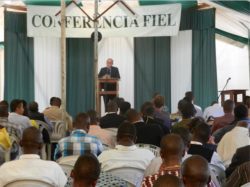
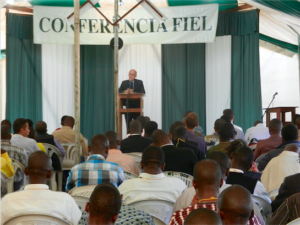
The following article is from Dr. Charles Woodrow (preaching left), a veteran missionary in Mozambique. HeartCry is not currently working in Mozambique, but we are watching closely as events unfold there. I met Dr. Woodrow of Grace Missions and the indigenous leaders of Mission Ekklesia in 2016. They are doing outstanding work in distributing good literature, conducting conferences, and theological training. This article offers and in-depth look at the challenges faced by Mozambican believers who come to understand and embrace biblical doctrine. (HeartCry takes no credit for the fine work of Dr. Woodrow, Grace Missions, and Mission Ekklesia. They are simply friends whom we respect, and this story is shared in the hopes of informing your prayers for the Mozambican church.)
“The story of Stélio represents another example of God working in the hearts of devoted Christians here in Nampula through the literature ministries of Grace Missions and Editora Fiel. Stélio was a member of a local church that preaches salvation by works – and the danger of losing your salvation if your works begin to fall short of the required threshold. This used to be the only gospel taught in Evangelical churches in Mozambique and probably is still the predominant one.
Stélio is in his late twenties. His notable devotion to God and His word lifted him at a young age to the positions of Sunday school teacher, evangelist, and instructor of Bibliology to others being trained as teachers by his denomination. His sincere interest in others and zeal for leading them to Christ gave him much influence in his sphere of acquaintances.
The pastor of his local assembly formerly participated in Editora Fiel’s reading program and for three years received one book every month. Years ago, Stélio discovered the treasure sitting on his pastor’s book shelf and began augmenting his Bible reading with these valuable resources. Like other bright young men before him (now leaders of Mission Ekklesia) he was at first shocked and, in Stélio’s case, even outraged when he began to notice evidences of the sovereignty of God in salvation that undergirded much of the writings. These notions blatantly contradicted what he had learned in his church, and he was sure they could not be true. Apparently as he talked about these “blasphemous doctrines” he uncovered Christians who had already embraced them either from seeing them during their own Bible study or more likely from exposure to our ministries. Vehemently he opposed these brothers wherever he found them – but for some reason he could not stop reading the books.
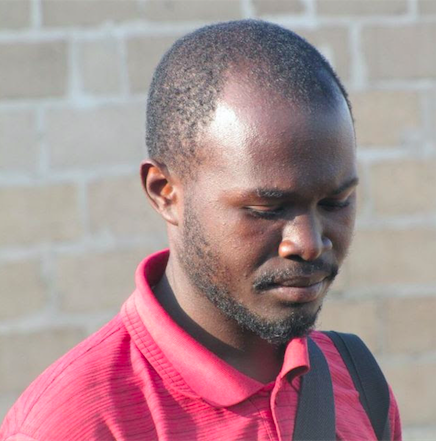
As he read this literature and carried on with his own daily Bible study, God opened Stelio’s (right) eyes to see that the doctrines he was rejecting so vocally were in fact all over the Scriptures! He was devastated, both because of this totally unexpected discovery which at first displeased him, and because his error in opposing the truths he now had to embrace was known by everyone. But embrace them he did. In a short time, God helped Stélio to see His sovereignty in saving hopelessly lost sinners as the glorious, gracious work that it is, rather than perceiving it through the negative lens of his own spiritual leaders. He became an ardent proclaimer of the truths he once abhorred. He could not help himself. The fire burned in his bones if he held back.
When his local pastor joined the staff of Stélio’s denomination, to conform to the teachings of his new superiors, he had readily abandoned truths previously learned through our Fiel conferences and literature. Two years ago, when Stélio began striving to publicly undo the damage he had caused in opposing the doctrines of grace, his pastor became alarmed, knowing full well that this ran contrary to the private beliefs of the regional pastor. No longer would he lend Stélio his books to study. But God led Stélio to our bookstore and library and soon he was spending hours reading the hundreds of titles available there. Paul Washer, Martin Lloyd-Jones, and Charles Spurgeon were favorite authors. ‘Today’s Gospel: Authentic or Synthetic?’ by Walter Chantry was especially used to help Stélio recognize the errors in the gospel he formerly taught. The next book that God used to forever transform his thinking was Paul Washer’s ‘Ten Indictments Against the Modern Church.’ This book opened wide Stélio’s eyes to desperately needed correction in the Mozambican church.
Stélio could not heed his pastor’s warnings to censor his teaching which he conducted several times a week outside the church as well as within. Instead, he tried to win over his pastor using Scripture. That was a failure as the pastor could neither counter his arguments nor accept them and still retain his leadership in the denomination. Frustrated and angry, in June the pastor referred the matter to the regional superintendent of the denomination. The doctrines that most raised the superintendent’s ire were those of election and perseverance. In August, at a joint meeting of all the local assemblies, Stélio was publicly censored as a heretic, his teaching responsibilities were terminated, and the people were warned not to listen to him any longer.
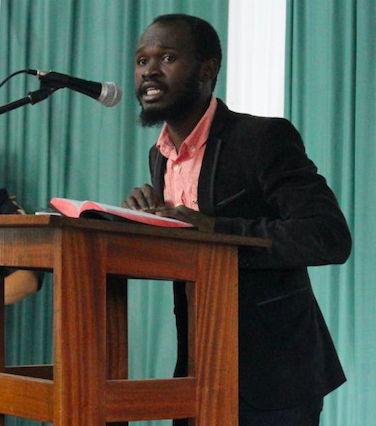
For a young man still in his 20’s, the experience of having the denominational head and all the local pastors arrayed against him publicly condemning his beliefs as heresy before their joined congregations was daunting. But God had convinced Stélio and he could not turn back. During the course of his ordeal, Stélio came, disconsolate, to our bookshop, asking if there was a church anywhere in Mozambique that believed the things in our books. He was immediately told about our own congregation. A short while later, just before last year’s Fiel Conference, he attended his first service with us. The Sunday after that he brought seven of his students with him. And nearly every Sunday since, additional people appear who have learned of the church through Stélio.
The problem for Stélio and his students is that they live on the opposite side of town and most cannot get to our location. We have offered to help Stélio set up a worship service on Sunday mornings near his own students and to rotate our four best preachers through the pulpit each month, but it appears neither Stélio nor those students who journey across town with him want to leave our congregation. We are concerned for those left behind who still do not have a place to worship. For the moment we are content to provide a refuge where Stélio can heal and find comfort among like-minded brethren before taking up again his responsibility to his followers.
From what I have seen, Stélio has done an excellent job training his people. All are committed to the true gospel to the point that they were prepared to abandon what is perhaps the largest and most influential denomination in Nampula when their young leader was discredited.
My acquaintance with Stélio began when he showed up at our church the Sunday before the Fiel Conference. He was clearly troubled and unsure what God had in store for him as he endured the tempest that finally resulted in his censure two weeks later. At the conference, Stélio distinguished himself among the pastors and leaders present by the understanding he had gained through his extensive reading.
The condemnation of Stélio’s doctrine two Sundays after the Fiel Conference was shocking to at least three people present when it occurred. Three medical students had just completed my week-long systematic theology course held immediately following the conference. All three belonged to different assemblies in the same denomination as Stélio. They had the highest three scores among the group of 23 students taking the course last August (below right), but more importantly, they truly grasped the doctrines taught and understood the life and death nature of getting the gospel right. They were all Sunday school teachers or youth leaders in their congregation, but they told me they did not see how they could go back to their church knowing what they had learned. I told them they must go back and seek to help others discover from Scripture what they now understood. The goal of our literature and conference ministry is not to divide and plunder other churches, but to help them all awaken and embrace the truth. But sometimes it cannot turn out that way. The first Sunday after the conference, the threesome were shattered to hear their church leaders pronounce anathema on the very doctrines they had just come to know and love in the preceding week.
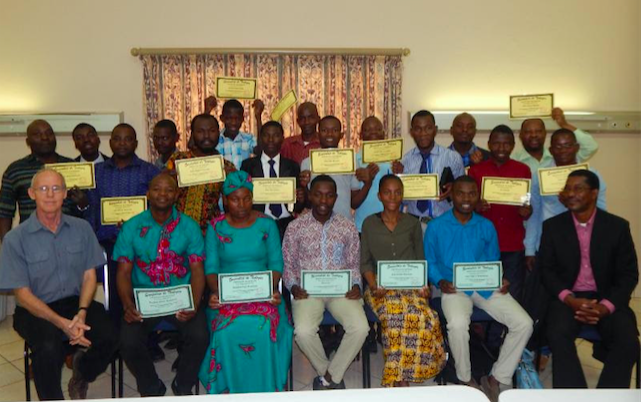
Still, they tried to follow my advice – but three months later, one of them, Carlos, showed up at our service with a look of abject misery on his face. He said they did not want to cause problems for our ministry to other churches, but they could not carry on in their local church any longer. They were seeking ways to graciously relinquish their responsibilities so they could leave and join a church that preached salvation by grace.
In the four months since, Stélio has become a permanent fixture in our congregation, and it is unusual for two Sundays to pass without visits from new friends he has influenced through his own evangelistic and discipleship ministries. Of these people, eleven have become regular attenders, despite the fact that it takes an hour by African “taxi” for them to reach our church from Stélio’s neighborhood.”

